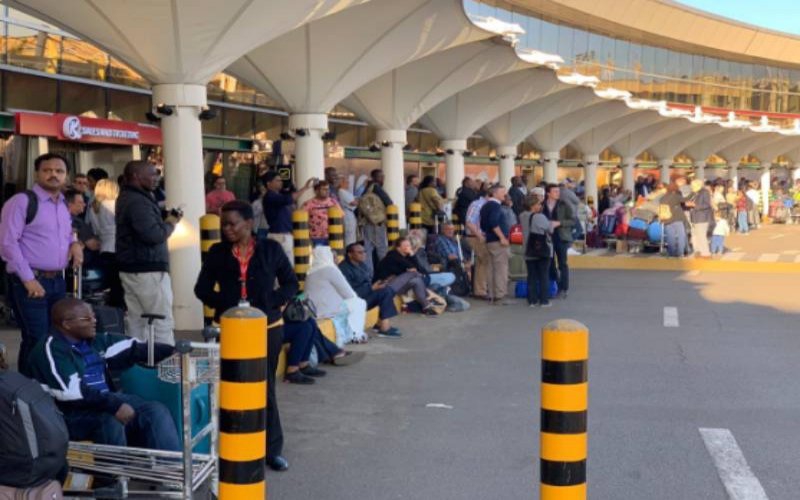Nairobi, Kenya – Operations at Jomo Kenyatta International Airport (JKIA) ground to a halt in the early hours of Wednesday after aviation workers launched a full-scale strike.
The industrial action has led to widespread flight cancellations and left thousands of travelers stranded at Kenya’s busiest airport.
The strike, which began at midnight, is a direct response to the proposed 30-year lease of JKIA to the Indian conglomerate Adani Group.
Workers Union Demands
The Kenya Aviation Workers Union (KAWU) has voiced strong opposition to the deal, fearing it could result in significant job losses and the erosion of workers’ rights. The union argues that the introduction of foreign workers under the proposed agreement would undermine the local workforce and threaten the livelihoods of Kenyan employees.
By dawn, the airport’s terminals were packed with frustrated passengers, many of whom had been waiting for hours with no clear indication of when flights would resume. Social media platforms were flooded with images and videos showing the chaos, with long lines of passengers outside the terminal and inside the airport’s waiting areas.
“This situation is unacceptable. I’ve been here since 2 a.m., and there’s been no communication from the airlines,” said one passenger who was scheduled to fly to Mombasa for a business meeting. “The authorities need to resolve this quickly.”
The strike has been in the making for several weeks, following a series of failed negotiations between KAWU and the Kenya Airports Authority (KAA).
The union had previously issued a notice of the impending industrial action, but a brief postponement occurred when the KAA partially complied with the union’s demands by sharing some details of the lease agreement. However, with no further concessions from the airport authority, the workers resumed their protest.
KAWU’s Secretary General, Moss Ndiema, has been at the forefront of the opposition, calling for the resignation of the KAA Board of Directors and key senior managers. Ndiema has accused them of incompetence and mishandling the proposed lease, which he claims would have dire consequences for the local workforce.
The Adani Deal
“The Adani deal is not just about upgrading the airport; it’s about the future of our workers and their families,” Ndiema stated in a press release.
“We cannot allow this agreement to go through without safeguards for our people. The government must prioritize Kenyan jobs and the well-being of our workers.”
The government, on the other hand, has defended the proposed deal with Adani Group, arguing that JKIA is in urgent need of modernization to meet growing passenger demand. The airport, which currently operates beyond its 7.5 million passenger capacity, requires significant investment to expand its facilities, including the construction of a second runway and a new passenger terminal.
The Adani deal, valued at $1.8 billion, is seen as a crucial step in achieving these upgrades. Despite the government’s assurances, the proposed lease has faced legal challenges.
Lawsuit Against Proposed Lease
On Monday, the High Court temporarily blocked the deal to allow for a judicial review, following a lawsuit filed by the Kenya Human Rights Commission (KHRC) and the Law Society of Kenya (LSK).
The petitioners argue that the lease is a violation of good governance and transparency principles, and could result in the loss of a valuable national asset.
As the strike continues, the impact on travelers is expected to worsen. Kenya Airways has already warned passengers of further delays and cancellations, with no clear timeline for when normal operations might resume.
The standoff has also raised concerns about the potential long-term effects on Kenya’s aviation industry, with stakeholders calling for a swift resolution to the crisis. As the situation develops, all eyes are on the government, KAWU, and the Adani Group to see whether a compromise can be reached that will safeguard the interests of both the nation and its workers.


